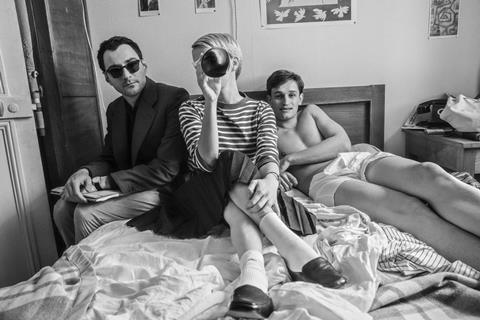Black-and-white French-language homage stars Guillaume Marbeck as legendary director Jean-Luc Godard

Dir: Richard Linklater. France. 2025. 105mins
Working almost entirely in French, Richard Linklater crafts a black-and-white film shot in Academy Ratio around the making of Jean-Luc Godard’s Breathless. This affectionate homage to a slice of urban French cool that has rarely been equalled is also a nostalgic tribute to a time and place of extraordinary creative ferment and cinematic sex appeal.
A nostalgic tribute to a time and place of extraordinary creative ferment
Godard famously declared that films must have “a beginning, a middle and an end, but not necessarily in that order”. This screenplay, by Holly Gent and Vince Palmo, ignores that last part to present what is essentially a chronological account of the gestation, financing, production and editing of a low-budget film which, as an end title needlessly reminds us, is considered one of the most influential of all time. But this is also a story about a bunch of young people – among them Belmondo, Truffaut, Seberg and Godard himself – who grabbed the zeitgeist and lit it as nonchalantly as they would a cigarette.
Nouvelle Vague will open in France in October, and the fact that it will be released with subtitles in non French-speaking territories (and there are likely to be many of these) will only add to its retro appeal – it’s impossible to imagine it being consumed any other way. Sure, it’s often granular in the detail of what went on day-by-day on the shoot, but its real appeal lies in the film’s sense that Godard was a kind of cinematic Bob Dylan, an artistic disruptor who looked good in shades.
He’s played by relatively untried French actor Guillaume Marbeck, who doesn’t just look like the young Godard but owns his mix of arrogance, irony and reticence, adding a charm that has not always been associated with the auteur. Also combining lookalike credibility with soul and spark are Aubry Duillin as an affably laid-back Jean-Paul Belmondo and Zoey Deutch as Jean Seberg, the Hollywood star on whom producer Georges de Beauregard (played here by Bruno Dreyfurst) was persuaded to spend a quarter of the film’s budget.
Exposition is aided by the new-wavish trick of presenting characters such as Truffaut, Agnes Varda or Eric Rohmer via on-screen name titles as they pause to glance at the camera. All were part of or close to the editorial team of Cahiers du Cinema, the film magazine which launched the New Wave and furnished most of its early directors. Godard is miffed at being one of the last to make the leap but, at the same time, he and we know that all you really needed to make a film (at least back then) is a girl, a gun and boundless confidence. Certainly not a script.
The young director’s approach to the 20-day shoot is well-documented: he would write scenes and lines on the hoof and send everyone home for the day when he had run out of ideas. This exasperates Seberg, amuses Belmondo and infuriates the otherwise good-natured producer; it also fuels the wry comic verve of an enterprise that is presented as half genuine desire to make a masterpiece by tearing up the rulebook, half a kind of punk rock provocation.
The script is maybe a little too eager to cram in every single bon mot Godard was recorded as delivering on set, every piece of advice given to him by mentors such as Roberto Rossellini or Jean-Pierre Melville, and to re-enact every creative solution the crew found to get around the stretched budget – like the mail cart lanky DoP Raoul Coutard (Matthieu Penchinat) crammed himself into so that street scenes could be shot without passers-by realizing a film was being made. But it never feels like a mere Wikipedia entry. David Chambille’s tactile cinematography drips with grain and atmosphere – a quality further pushed by an era-appropriate soundtrack of cool jazz by Quincy Jones and others alongside dance classics like ’Hully Gully’.
Nouvelle Vague never forgets that the term which provides its title had nothing to do with cinema when it was coined. It referred to a new French wave of independent, confident young people who acted like they owned the place.
Production companies: ARP
International sales: Goodfellas, feripret@goodfellas.film
Producers: Michele Petin, Laurent Petin
Screenplay: Holly Gent, Vince Palmo
Cinematography: David Chambille
Production design: Katia Wyszkop
Editing: Catherine Schwartz
Main cast: Guillaume Marbeck, Aubry Dullin, Zoey Deutch, Adrien Rouyard, Antoine Besson, Jodie Ruth Forest, Bruno Dreyfurst, Benjamin Clery, Matthieu Penchinat

























No comments yet